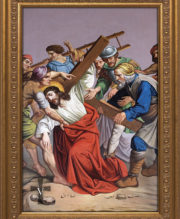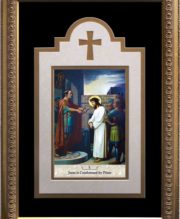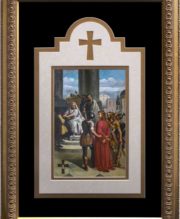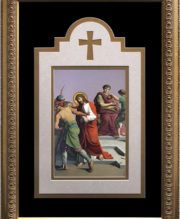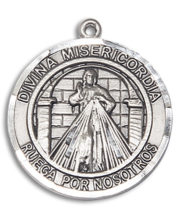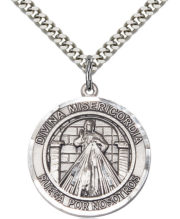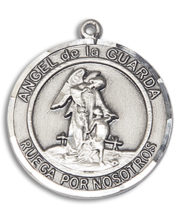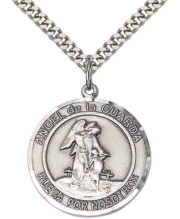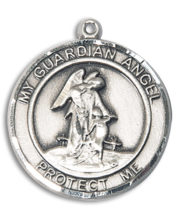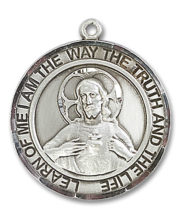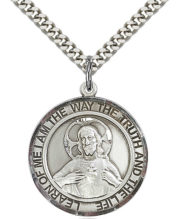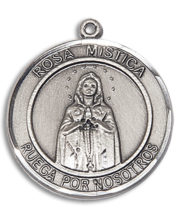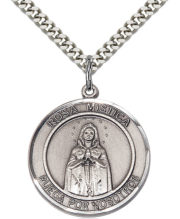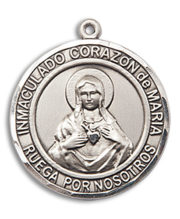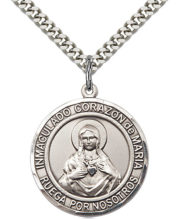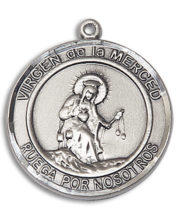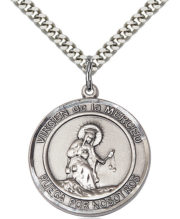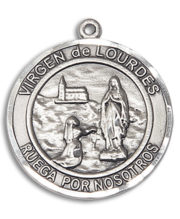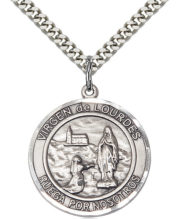Saints
St. Hugh of Lincoln Patron Saint of Sick Children
A contemporary of St. Richard of Chichester, St. Hugh of Lincoln faced staunch opposition of English Kings but fought tirelessly for the Catholic Church, ecspecially for sick children. St. Hugh of Lincoln was born in France and became a member of a religious community when he was fifteen. He lived from 1140 to 1200 and the feast day of St. Hugh of Lincoln is celebrated in the Catholic Church on November 17th. Learn more about the incredible life of this Holy King, St. Richard of Chichester the patron saint for sick children.
The Holy Life of St. Hugh of Lincoln
Hugh attended classes with the boys who were being educated by the Canons. When he was fifteen he became a member of the community. His first task was to care for his father, now old and frail, and he was with his father when the latter died. When Hugh was nineteen he was made a deacon.
The young deacon was sent on a visit to the famous Carthusian monastery, the Grand Chartreuse. He was attracted to the austere Carthusian life and with some difficulty secured permission to become a Carthusian. He entered the Grande Chartreuse when he was twenty-three. He lived in his own little cottage and had his own little garden. In common with the other monks he fasted and abstained from flesh meat, wore a hair shirt, and practiced complete obedience. With his brethren he chanted the Office morning and evening and at midnight. Silence was observed at all times except from noon until vespers on Sundays and great feasts. Everything in his life tended to dispose his soul to recollection. This was the kind of life Hugh desired, and he was happy.
St. Hugh’s Service to the Church
Hugh was ordained a priest and at thirty-three was made procurator of the monastery. He supervised the lay brothers, welcomed visitors, and distributed alms to the poor. He performed these active duties well, but he longed to return to the solitude of the monastery.
King Henry II of England, in penance for his part in the murder of Thomas à Becket, had vowed to establish two Carthusian monasteries in his country. The first started at Witham in 1178, was not successful. The serfs, who made a living from the soil, did not wish to give up their land to the foreigners. The first prior broke down from the strain, and the second died. One of the king’s advisers then prompted him to ask for Hugh to be the new prior, and the king did so.
Hugh did not wish to accept the post, saying that he could not govern his own soul and so could not govern others. The prior of the Grand Chartreuse also opposed the move because he did not wish to lose Hugh. The Bishop of Grenoble, who was himself a Carthusian, overruled both.
He commanded Hugh to accept the post, saying: “The only Son of the Eternal Father, quitting … ineffable tranquility … clothed himself in our human nature for the salvation of the world. You too must make the sacrifice of your quiet cell, and of the companionship of the brothers you love.”
Establishing Cathusian Monastery
 When Hugh left the Grande Chartreuse he took at least one lay brother with him, an old monk named Aynard. It was a long journey by mule and ship to a foreign land and an unfriendly people. At Witham he called together the serfs who would be forced to move and promised them either complete freedom or a transfer to other lands. He also told them that they would be paid for the huts they would have to give up. After this, the serfs felt friendlier toward the Carthusians.
When Hugh left the Grande Chartreuse he took at least one lay brother with him, an old monk named Aynard. It was a long journey by mule and ship to a foreign land and an unfriendly people. At Witham he called together the serfs who would be forced to move and promised them either complete freedom or a transfer to other lands. He also told them that they would be paid for the huts they would have to give up. After this, the serfs felt friendlier toward the Carthusians.
King Henry agreed to all this but then failed to keep his promises. This conduct so angered Aynard that he told the king what he thought of him and said that the Carthusians should leave England. The king, on the verge of one of his violent explosions of temper, turned to Hugh and said: “Will you leave also?”
In a gentle voice, Hugh said: “No.” He said he knew the king had many things on his mind but that he was confident the king would keep his pledged word.
The king was so happy with this that he at once repaid the serfs for their losses. Soon afterward he sent Hugh a costly present, a Bible which he had coaxed from another monastery, St. Swithin’s. Hugh was embarrassed by this gift, and he returned it. For six years Hugh governed the Witham Charterhouse.
St. Hugh is Appointed Bishop of Lincoln
Then, in 1186, Henry announced that he had appointed Hugh to be Bishop of Lincoln. Hugh had no intention of accepting the post, saying that the king had no right to make such an appointment. But the appointment was confirmed by the proper ecclesiastical authorities, and once more Hugh was forced to accept a post he did not wish. His last hope of returning to the Grande Chartreuse had gone.
Only for a short period each year was he able to return to the solitude of the monastery he loved. Lincoln had been without a bishop for many years, so Hugh faced the problem of restoring and rebuilding. His duties were not only ecclesiastical; they included the administration of the Church courts, which were very important at that time.
He was also obliged to maintain a running fight with the civil power, headed by three temperamental kings. When Henry II died, he was succeeded first by his oldest son Richard the Lion-hearted, and then by his younger son John. Hugh came into conflict with all three. He resisted the royal demands on the Church for money, for armed men, and for clergy to serve as ambassadors at their own expense.
St. Hugh Was A Holy Bishop and Advisor to the King
Hugh rarely resorted to his authority, preferring to use tact and persuasion. But his authority was very effective when he used it, as King Richard found out. Richard published a decree confiscating all the possessions of the diocese of Lincoln. To his great consternation, he could not find anyone to carry out his decree; the bishop had announced that all who took Church property would be excommunicated. The bishop showed deep sympathy for the sick. He regularly visited the leper hospital in his diocese and did not shrink from the touch of those suffering the dread disease. He was especially attentive to the burial of the dead at a time when corpses were often neglected.
St. Hugh of Lincolns Defends the Jewish People
Once he risked being late for an appointment with King Richard, in order to conduct a funeral for an abandoned corpse that had been found in the street. At a time when Jew-baiting was rampant in England, Hugh took a strong stand in defense of the Jews. He once threw himself unarmed into a crowd of anti-Semitic demonstrators and was almost killed. It is not surprising that the Jews wept in the streets of Lincoln when Hugh’s funeral procession passed.
In 1200, Hugh went to France on an errand for King John. He visited his old home, the Castle of Avalon, and his beloved monastery, the Grande Chartreuse. He was ill when he returned to England. He died in November, 1200, wearing his Carthusian habit and lying on a cross of ashes on the floor. At his direction, Compline was being recited in his room. The chanters had reached the words Nunc dimittis (Now Thou dost dismiss Thy servant) when he breathed his last.
Twenty years after his death Hugh was canonized by Pope Honorius III.
Prayers to St. Hugh of Lincoln
St. Hugh of Lincoln Prayer
O holy God, you endowed your servant and bishop Hugh of Lincoln with wise and cheerful boldness, and taught him to commend the discipline of holy life to kings and princes: Grant that we also, rejoicing in the Good News of your mercy, and fearing nothing but the loss of you, may be bold to speak the truth in love, in the name of Jesus Christ our Redeemer, who lives and reigns with you and the Holy Spirit, one God, for ever and ever. Amen.
Novena to St. Hugh of Lincoln Patron Saint of Sick Children
O God,who endowed Your servant Hugh
with a wise and cheerful boldness
and taught him to commend to earthly rulers
the discipline of a holy life:
give us grace like him to be bold
in the service of the gospel,
putting our confidence in Christ alone,
who is alive and reigns with you,
in the unity of the Holy Spirit,
one God, now and for ever.
Amen.
Dear Saint Hugh of Lincoln,
As Bishop and shepherd of the faithful,
Your virtues shone brightly as you endeavored
With remarkable apostolic zeal
To labor for the honor of God
and the salvation of souls.
To obtain Divine aid in the many needs,
You took refuge in prayer, fasting, and other penances.
When tempted, you called upon the Blessed Virgin,
obtaining such strength, that your could withstand temptations.
The sacrifice of Holy Mass you performed with such devotion,
That several times you received the grace to see the Lord
In the form of a lovely child, in the Holy Eucharist.
Saint Hugh, defender of the faith,
You would rather die than renounce your calling to serve.
I ask you today Saint Hugh
To intercede before God on my behalf,
That I may obtain the favour that I seek.
[Mention your need(s) here…]
Amen.
OTHER SAINTS NAMED HUGH:
- St. Hugh of Cluny, 10241109 Adviser to popes and sovereigns. Feast Day: April 29.
- St. Hugh of Grenoble, 10531131 Austere Bishop of Grenoble. Feast Day: April 1.
- St. Hugh of Montaigu, died about 1136. Abbot and later Bishop of St. Germain in Auxerre. Feast Day: August 10.
Church Supplies
Church Supplies
Medals and Pendants
Angel Pendants
Angel Pendants
Medals and Pendants
Medals and Pendants
Immaculate Heart of Mary
Corazon Inmaculado De Maria Round Medal and Necklace, Spanish
Medals and Pendants
Medals and Pendants

